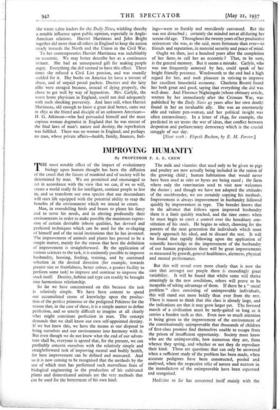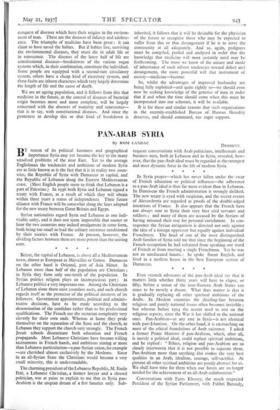IMPROVING HUMANITY
By PROFESSOR F. A. E. CREW
THE most notable effect of the impact of evolutionary biology upon human thought has been the diffusion of the creed that the future of mankind and of society will be determined by man. We are permitted and encouraged to act in accordance with the view that we can, if we so will, create a world really fit for intelligent, sentient people to live in, and so transform our own species that our descendants will start life equipped with the potential ability to reap the benefits of the environment which we intend to create.
Man, in remodelling birds and beasts to please his fancy and to serve his needs, and in altering profoundly their environments in order to make possible the maximum expres- sion of certain desirable inborn qualities, has devised and perfected techniques which can be used for the re-shaping of himself and of the social institutions that he has invented. The improvement of animals and plants has proved to be a simple matter, mainly for the reason that here the definition of improvement is straightforward. By the application of various sciences to the task, it is eminently possible to improve husbandry, housing, feeding, training, and by continued selection in the desired direction (for example, towards greater size or fruitfulness, better colour, a greater facility to perform some task) to improve and continue to improve the stock itself. Destiny, habitat and type can readily be brought into harmonious relationship.
So far we have concentrated on this because the task is relatively simple. We have been content to spend our accumulated stores of knowledge upon the produc- tion of the perfect primrose or the pedigreed Pekinese for the reason that, in the case of these, it is a simple matter to define perfection, and so utterly difficult to imagine at all clearly what might constitute perfection in man. The concept demands that we shall know our own self-appointed destiny. If we but knew this, we have the means at our disposal to bring ourselves and our environment into harmony with it. But even though we do not know what the end of our adven- ture shall be, everyone is agreed that, for the present, we can profitably concern ourselves with the relatively simple and straightforward task of improving mental and bodily health, for here improvement can be defined and measured. And so it is now coming to be recognised that the methods by the use of which man has performed such marvellous feats of biological engineering in the production of his cultivated plants and domesticated animals are the very methods that can be used for the betterment of his own kind. The milk and vitamins that used only to be given to pigs and poultry are now actually being included in the ration of the growing child ; human habitations that would never have been used as sties or byres are being razed ; the farm where only the veterinarian used to visit now welcomes the doctor ; and though we have not adopted the attitudes of the stockbreeder, we are certainly copying his methods. Improvement is always improvement in husbandry followed quickly by improvement in type. The breeder knows that to the advance that follows upori improved husbandry there is a limit quickly reached, and the time comes when he must begin to exert a control over the hereditary con- stitution of his stock. He begins to select, choosing for the parents of the next generation the individuals which most nearly approach his ideal, and to discard the rest. It will be found that rapidly following upon the application of scientific knowledge to the improvement of the husbandry of our human population there will be great improvements as measured by growth, general healthiness, alertness, physical and mental performance.
But this will reveal even more clearly than is now the case that amongst our people there is exceedingly great variability. It will be found that whilst some will thrive amazingly in the new conditions, others will prove to be incapable of taking advantage of them. If there be a " social problem " class consisting of unimprovable individuals, this will stand out more boldly than ever from the rest. There is reason to think that this class is already large, and the indications are that it may grow larger yet. The forward march of a civilisation must be tardy-gaited so long as it carries a burden such as this. Even now so much attention is being given to the improvement of the environment of the constitutionally unimprovable that thousands of children of first-class promise find themselves unable to escape from the prison of insufficient opportunity. Society must know who are the unimprovable, how numerous they are, from whence they spring, and whether or not they do reproduce their kind. These are questions that can only be answered when a sufficient study of the problem has been made, when accurate pedigrees have been constructed, pooled and analysed, when the respective roles of nature and nurture in the manufacture of the unimprovable have been separated and recognised.
Medicine so far has concerned itself mainly with the conquest of diseases which have their origins in the environ- ment of man. These are the diseases of infancy and adolesc- ence. The triumphs of medicine have been great : it can claim to have saved the babies. But if babies live, surviving the environmental diseases, they must die in adult life or in senescence. The diseases of the latter half of life are constitutional diseases—breakdowns of the various organ systems which, in their combination, constitute the individual. Some people are equipped with a second-rate circulatory system, others have a cheap kind of excretory system, and these faults are inborn characters which very largely determine the length of life and the cause of death.
We are an ageing population, and it follows from this that medicine in the future, as the control of diseases of bacterial origin becomes more and more complete, will be largely concerned with the diseases of maturity and senescence— that is to say, with constitutional diseases. And since the proneness to develop this or that kind of breakdown is inherited, it follows that it will be desirable for the physician of the future to recognise those who may be expected to suffer from this or that derangement if he is to serve the community at all adequately. And so, again, pedigrees must be compiled, pooled and analysed in order that the knowledge that medicine will most certainly need may be forthcoming. The more we know of the nature and mode of inheritance of such inborn tendencies toward defect and derangement, the more powerful will that instrument of society—medicine—become.
So, whilst the advantages of improved husbandry are being fully exploited—and quite rightly so—we should even now be seeking knowledge of the genetics of man in order that if and when the time should come when this must be incorporated into our schemes, it will be available.
It is for these and similar reasons that such organisations as the recently-established Bureau of Human Heredity deserves, and should command, our eager support.















































 Previous page
Previous page